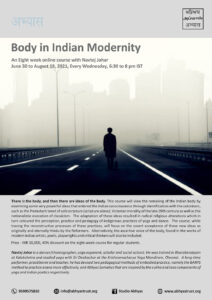 There is the body, and then there are ideas of the body. This course will view the remaking of the Indian body by examining some very powerful ideas that entered the Indian consciousness through identification with the colonisers, such as the Protestant tenet of sola scriptura (scripture alone); Victorian morality of the late 19th century as well as the nationalistic evocation of classicism. The adaptation of these ideas resulted in radical religious alterations which in turn coloured the perception, practice and pedagogy of indigenous practices of yoga and dance. The course, while tracing the reconstructive processes of these practices, will focus on the covert acceptance of these new ideas as originally and eternally Hindu by the Reformers. Alternatively, the assertive voice of the body, found in the works of modern Indian artists, poets, playwrights and critical thinkers will also be included.
There is the body, and then there are ideas of the body. This course will view the remaking of the Indian body by examining some very powerful ideas that entered the Indian consciousness through identification with the colonisers, such as the Protestant tenet of sola scriptura (scripture alone); Victorian morality of the late 19th century as well as the nationalistic evocation of classicism. The adaptation of these ideas resulted in radical religious alterations which in turn coloured the perception, practice and pedagogy of indigenous practices of yoga and dance. The course, while tracing the reconstructive processes of these practices, will focus on the covert acceptance of these new ideas as originally and eternally Hindu by the Reformers. Alternatively, the assertive voice of the body, found in the works of modern Indian artists, poets, playwrights and critical thinkers will also be included.
Price – INR 10,000
40% discount on the eight-week course for regular students.
FAQs –
- Date & Time – June 30 to August 18, 2021. Every Wednesday 6:30 to 8 pm IST
- This is a certificate course, and participants can avail the certificate only after successfully completing the course and submitting a written assignment in the form of – a short essay, or an academic paper.
- The sessions will be offered via Zoom.
- Sessions will also be recorded and accessible only for the following one week till the next session. This is for the benefit of those who are unable to attend the live session on particular days.
- Participants will have to sign a form which will confirm that no private recordings and sharing of any material related to the class will be done under any circumstances.
- The course, not strictly academic, will require reading, approx. 20 – 30 pages per week. Each session will begin with a recap of these readings. The reading list is subject to change depending upon the direction our conversations will take.
- Some of the texts that would be discussed in the course –
* Europe’s India, Sanjay Subrahmanyam
* Colonizing the Body, David Arnold
* The Nation and its fragments, Partha Chatterjee
* Nationalism without a Nation in India, G Aloysius
* Religion and the rise of Capitalism, R H Tawney
* Unthinking Mastrey, Julietta Singh
* Theosophy and Yoga, Jenny Baker and Annie Besant
* India’s Kathak dance in historical perspective, Margaret Walker
* Gita Press and the making of Hindu India, AkshayaMukul
* Vijay Tendulkar plays
* Francis Newton Souza, Bridging Western and Indian Modern Art, Kurtha Aziz and others.
- COURSE MODULE –
- Module 1 – 4 weeks, Body in Indian classical dance & yoga
Historically, the physical body and the idea of the body in both Indian classical dance and yoga have undergone tremendous change. With the incorporation of protestant ideas of moral purity, desexualizing the form, imposition of text over the body, and later with a focus on the correctness of the form while completely absenting the sensitivity of the body, the embodied practices of dance and yoga have transformed in the last 200 years. This section will focus on these changes in the practices and what remains of them today.
- Module 2 – 4 weeks, Body in Modern Indian Art
While the idea of the body in the embodied practices were going through numerous changes and becoming desexualized, pure & pious practices; devoid of any lived histories, at the same time the idea of the body and its representation in modern Indian art was taking a completely different turn. The work of artists and writers like, Amrita Sher-Gil, Francis Newton Souza, and playwright Vijay Tendulkar, and many others were reclaiming the body and allowing it to assert and speak for itself. This module will study these artists and their work closely.
